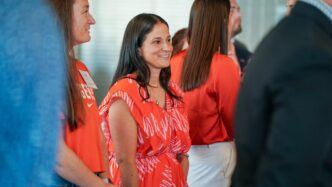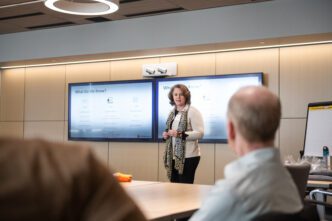Editor’s Note: The monthly “Elevate Well-Being” blog series shares thoughts and reflections of Clemson Well-Being Council members and University faculty and staff. Our September 2025 blog is courtesy Natalie Honnen, executive senior associate athletics director.
I used to believe the best leaders had to have all the answers and show no weakness — that vulnerability should be hidden behind endless preparation and long work hours. Over time, I’ve learned leadership isn’t about avoiding struggle — great leaders know struggle is part of the process and are willing to address it before it becomes overwhelming.
September is Suicide Prevention Month, and part of prevention is early action. For me, that has meant reaching out to mental health professionals, and leaning on trusted people in my life. It has meant recognizing my well-being is worth prioritizing, even when life is demanding and unpredictable.
Motherhood was the turning point for me. In a highly competitive and male-dominated industry, I didn’t see many women thriving professionally while being fully present as mothers. The unspoken message was you could be one or the other — but not both. If I couldn’t see the examples, I wanted to be an example you can do it all.

Being a mom made me more human, not less. It softened edges I didn’t know I had. It made me have to let people in to see all aspects of me. The messy parts, the polished parts and the parts where I had no answers but was just trying to get through the day. It became about integrating them in a way inspiring others to believe they can succeed without sacrificing themselves.
My realization is vulnerability and transparency — those softened edges — made me stronger as a whole. Being human made me a better leader. My authenticity made it easier to create an environment where real conversations happen, and that became the expectation. Culture and conversation became my focus, not just tasks needing to be done.
Psychological safety is the term I leaned into — creating an environment where it feels safe to speak up, share honest feedback, admit mistakes and be vulnerable. I believe leadership is about the willingness to be vulnerable and to create that safety for everyone, regardless of role. Leadership isn’t just one person at the front — it’s creating a culture where every individual is seen as human and valued for the unique perspective they bring to the table.
To succeed at this, you must take care of yourself — physically and mentally. Leaders need to be willing to share this side of themselves, show these actions are not a weakness, but rather a strength. The more we do this and lead by example, the more people will be willing to proactively ask for help.
Trust me, I don’t have it all figured out. But I know this, taking care of our own well-being is a part of taking care of our leadership and the other humans around us. I hope sharing my story encourages someone else to take that first step.
This September, and every month after, let’s remember: You are allowed to be human, and being human means we need each other.
Clemson has resources available to students who may be struggling through the CARE Network and Counseling and Psychological Services. ComPsych is the University’s Employee Assistance Program for faculty and staff in need of resources.








